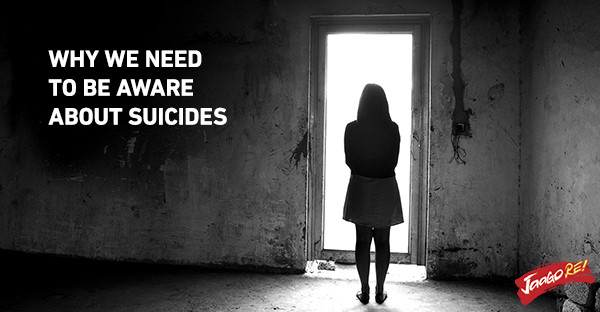Why we need to talk about suicide

“A boy who was living with his roommate woke up one morning and decided to take his life by jumping in front of a train. He was lonely and upset, inspite of having spent the previous night with some of his friends. His roommate till today doesn’t know about the extreme step he was about to take.“
According to the World Health Organization, India has the highest number of suicides. The youth, especially between the ages of 15-29 years constitute the highest portion of these suicides. Why, you may ask? What makes them take this grave decision? According to sources, family problems are the leading cause. So this brings us to our next question- How can we as as a country priding ourselves on having a tradition of close knit families be in such a situation?
Mr. Vinny George a Psychologist with Sampurna Montfort Counselling and Psychological Services (SCAPS) says, “In our country since we are kids, we are taught not to cry and to be strong, which creates a stigma around weakness. If you are depressed then you are weak hence people find it every difficult to talk about their problems even to their parents.”
It’s not just the youth who are taking this drastic step, suicides have been affecting one of our most needed workforce-Farmers, as crops fail and they find it difficult to make ends meet, many farmers take this unfortunate step to end their misery thus leaving behind a family who has to live with this burden. Though the media has pointed it time and again it’s taken a long time for the issue to come to the forefront. According to the recent suicide data revealed by NCRB, 4.3% (5,650) of all suicides were committed by farmers across India but the statistics also revealed something more shocking- 18% (20,412) of all suicides committed were by housewives/homemakers.
According to IndiaSpends, these housewife statistics also combine suicides among women farmers as India doesn’t traditionally view farmers to be female. Majority of the causes of suicide relate to family problems but not necessarily related to their marital issues. The study also finds that suicides are deep rooted in India’s patriarchy. The stigma that surrounds us discussing depression and mental health issues is worrying and leading to suicidal tendencies.
The fact that India criminalises suicide also contributes to the factor. Under Section 309 of the Indian Penal Code from the Statute book, “suicide bid is punishable with imprisonment up to one year, or with fine, or both.” Though the government has moved to decriminalise it, the bill is yet to be passed.
Mr. Vinny George also explains that one of the other reasons that makes people less aware about the signs of suicide is that there are proper records detailing the number of suicides. “In one of the previous data it was revealed that Bangalore had no suicides in a particular year” he says, “but we all know that isn’t true.”
He also adds that, in countries like the USA, “there is only one suicide helpline which people call to and there is not much confusion but in India, there are many voluntary organizations who give their time to help people change their minds about taking the extreme step. These organizations hire people and train them but since there aren’t too many of them doing it, they burn out quite easily. It would be so efficient if there was a helpline pan-India.”
It’s not just helplines that there is a dearth of. Even the number of counsellors and therapists is lacking, thus reducing awareness and the help that could be given to people (India is short of professionals for medical illnesses by 87%). Not only is it considered taboo to talk about depression or mental illness but to be someone who can help them is also looked down upon. Though many colleges have started specializations in Psychology and other subjects that could help treating mental illness, they still are not comfortable with putting up posters or having talks about suicide. Mr. George says, “They feel youngsters are more likely to commit suicide if they are made aware of it but they do not understand that there are correct ways and plans that can be used. When people know that they have someone to talk to who won’t judge them, they will try and get help.”
If you want to share your experiences on suicide get in touch with us at jaagorein@gmail.com or comment below.
SCAPS recently held a suicide prevention campaign in Bangalore and on 10th September which marks anti-Suicide day, they are holding a candle light event for people to participate and share their experiences. The event will also be held in Bangalore.
****
Sources:
Thanks to Mr. Vinny George from SCAPS.
IndiaSpend
FirstPost
NCRB
****
Share this story on





